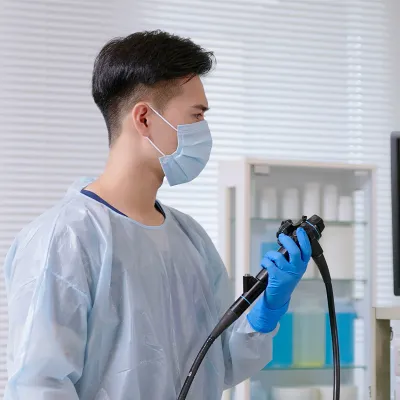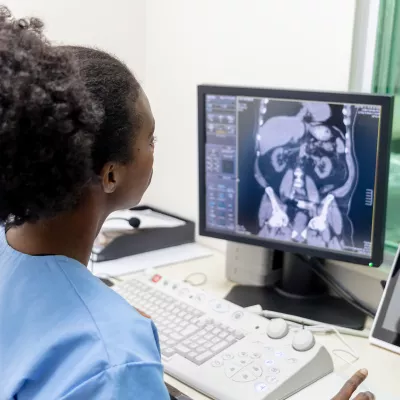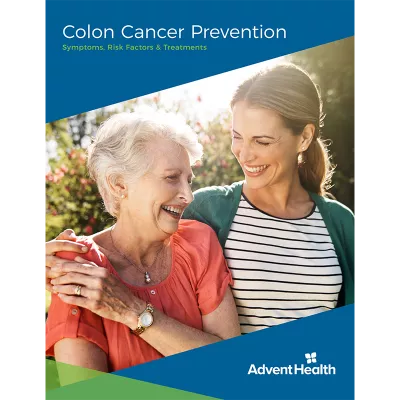
Making It Easy to Get Screened for Colon Cancer
Colorectal cancer is the second-leading cause of cancer-related deaths in America. And more than 90% of those cases are curable if diagnosed early. We’re committed to making your colorectal cancer screening as convenient as possible, which is why we offer direct access colonoscopies for qualifying individuals.
With a direct access colonoscopy, patients can save time and additional expenses by expediting their procedure directly without needing a consultation with their gastrointestinal specialist in the office beforehand. Healthy patients aged 45 or older or those with positive Cologuard or fecal immunochemical test (FIT) results are candidates for direct access colonoscopies.
Colon Cancer Screening Options

Colonoscopy
When it comes to screening for colorectal cancer, a colonoscopy is the gold standard of care. A colonoscopy is an outpatient endoscopic procedure performed by a gastroenterologist to examine the inside of your colon. During this procedure, a small camera at the end of a long, flexible tube is inserted through the anus and advanced through the colon. If polyps (precancerous growths) are found, they can be removed, so they do not turn into colon cancer.
In addition to screening for colon cancer, your colonoscopy provides a visual of your overall gut health and gives your care team insight into ways to care for your unique gastrointestinal health needs.

Computed Tomography (CT) Scan
A CT scan creates and captures 3D images of the colon, allowing the physician to detect any abnormalities. If abnormalities are detected, your gastroenterologist will order a colonoscopy for further testing.

Stool-Based Testing
Depending on insurance coverage, your gastroenterologist may order stool-based tests such as a fecal immunochemical test (FIT) or a stool DNA test to screen for colorectal cancer.
A fecal immunochemical test detects microscopic amounts of blood in the stool, and a stool DNA test analyzes the stool for generic changes that may indicate cancer. If either test comes back positive, a colonoscopy will still be required.

The Power to Stay Informed
Knowledge is power — especially when it can protect your health and well-being. This guide on colon cancer was created to educate and empower you by answering the following questions:
- What are the symptoms of colon cancer?
- How can I reduce my chance of developing colon cancer?
- Exactly how invasive is a colonoscopy?
- What’s the best treatment method?

Putting You First
From the Start
As Central Florida’s #1 Gastroenterology program, we have the team and expert care for every step of your journey, connected to the entire AdventHealth network of care.
On a Mission to Advance Digestive Care
Our expert doctors and nurses are nationally acclaimed as thought leaders, dedicated to improving the level of digestive care for our patients.

#1 Hospital in Florida
AdventHealth Orlando is recognized as the #1 health care network in Florida and among the top 20 hospitals in the nation.

Only National Leader in Greater Orlando
AdventHealth Orlando, which includes nine hospital locations, is the only health care network nationally recognized for gastroenterology care in Greater Orlando.

National Accreditation Program for Rectal Cancer
AdventHealth Orlando’s rectal cancer program has received a three-year certification from the National Accreditation Program for Rectal Cancer (NAPRC). This accreditation, a collaboration between the Optimizing the Surgical Treatment of Rectal Cancer (OSTRiCH) Consortium and the Commission on Cancer (CoC), certifies that a multidisciplinary team of digestive and cancer specialists come together to determine the best approach to patient care.

Nationally Recognized for Patient Safety, Quality and Transparency
The Leapfrog Group has exclusively recognized AdventHealth with the Emerald Award for remarkable achievements and leadership in patient safety, quality and transparency by a health care system, including maintaining a culture of excellence throughout all levels of the organization.
Take Charge of Your Health
Whole-person care empowers you to take your health into your own hands. Going beyond the traditional, you’ll have access to multiple programs and resources that target long-lasting lifestyle changes, with emphasis on diet and exercise to nourish your sustained well-being. It’s all about making you feel whole again — in body, mind and spirit.
Or call us at 407-961-6685.

